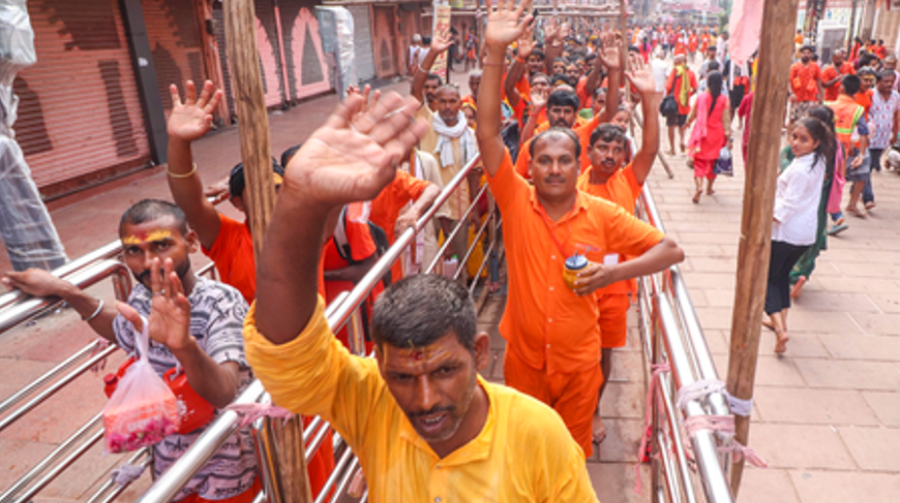Festivals
Devotees Flock in Large Numbers to Shiva Temples Across India on Third Monday of Sawan
Introduction
On the auspicious third Monday of the Sawan month, temples dedicated to Lord Shiva witnessed a massive inflow of devotees, who arrived with faith-filled hearts and offerings in hand. From metros to small villages, the spiritual energy was palpable, reaffirming the deep-rooted significance of this day in Hindu tradition.

Significance of Sawan and the Third Monday
Sawan, or Shravan Maas, is the fifth month in the Hindu lunar calendar and is entirely dedicated to the worship of Lord Shiva. Each Monday of this holy month—called Sawan Somwar—is considered highly auspicious.
The third Monday holds special reverence because:
- It marks the spiritual midpoint of Sawan
- Many believe that prayers on this day are instantly heard by Mahadev
- It’s said to fulfill wishes related to health, relationships, and prosperity
Devotee Observances and Fasting Rituals
Devotees wake up before dawn, bathe, wear clean (often saffron or white) clothing, and observe a strict fast (vrat). Many offer:
- Water mixed with milk, honey, and curd
- Bael leaves, which are considered Lord Shiva’s favorite
- Bhasma (sacred ash) and sandalwood paste
- White flowers, dhatura, and bhang
Chanting of mantras like “Om Namah Shivaya” and the Maha Mrityunjaya Mantra echoes throughout the day in homes and temples.
Major Celebrations Across Prominent Shiva Temples
Kashi Vishwanath – Varanasi
The ghats of the Ganges in Varanasi were packed as thousands offered Ganga Jal to Baba Vishwanath. The temple corridors overflowed with flower vendors, bhajan mandalis, and long queues of devotees.
Mahakaleshwar – Ujjain
A majestic Bhasma Aarti at 4 AM marked the beginning of the day. Pilgrims from Maharashtra, Madhya Pradesh, and Rajasthan flocked to witness this ancient, mystical ritual.
Somnath – Gujarat
With the Arabian Sea in the backdrop, devotees offered coconuts and performed abhishekam in the serene Somnath temple complex. Security personnel ensured peaceful darshan for all.
Baidyanath Dham – Jharkhand
Kanwariyas, who walked for days carrying holy Ganga water, arrived chanting “Bol Bam.” The entire Deoghar town transformed into a spiritual fairground, buzzing with bhajans and devotional enthusiasm.
Lingaraj Temple – Bhubaneswar
In Odisha, the Lingaraj temple saw grand processions with temple musicians and elephant-led parades. Special lighting and flower decorations adorned the temple.
Kanwar Yatra: A Journey of Faith
The Kanwar Yatra, a defining part of Sawan, saw record numbers this year. Barefoot devotees carried Kanwars (decorated water carriers) across hundreds of kilometers to pour water on Shiva lingams in temples of their choice. For many, this journey is a personal vow, undertaken in gratitude or penance.
Security, Sanitation & Crowd Management Measures
State governments deployed:
- Thousands of police and disaster response personnel
- Medical booths and mobile clinics
- Separate lanes for elderly and women
- Drones and CCTV for crowd monitoring
- Massive water distribution and prasad counters
Cultural and Economic Impact
Sawan Somwar is more than just a religious event. It:
- Boosts local economies—flower sellers, sweet shops, and transport operators see increased sales
- Inspires community bonding through shared spiritual activities
- Revives folk music and local temple arts
Devotee Voices: Why They Return Every Year
“I’ve been coming to Kashi for the last 7 years every Sawan. I feel peace I can’t describe,” said Rajesh Tripathi, a Kanwariya from Allahabad.
“My business took off after last year’s fast. This is my way of saying thanks to Bholenath,” shared Pratibha, a boutique owner from Patna.
Conclusion
The third Monday of Sawan showcased India’s spiritual heartbeat. With chanting, colors, and community spirit, this holy day once again reaffirmed the enduring love for Lord Shiva across the country.